Oct 2, 2017
Food, environment and human health, local economy and resilient communities
By Elena Karoulina
Executive Director of Sustainable Solano
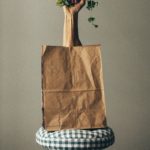
Image from Pixabay
When was the last time you had Solano-grown produce on your dinner table? The most possible answer is ‘never’, unless you grow your own food in your garden or your backyard food forest. It’s a very unusual situation for a Bay Area county that is still largely agrarian, at least in the land use patterns.
Sustainable Solano is embarking on a new project to bring more local food to our communities and to connect our local farmers, chefs, and residents with the gifts of our land and with each other.
At the very end of September we received great news from the United States Department of Agriculture (USDA): our proposal to further our vision by developing a business plan for Solano Community Food Centers was selected for funding! Annually, USDA funds about 14% of grant applications for local food projects, and we are honored to earn support on a federal level.
What is a Community Food Center? It is a hub for local food activities: CSAs deliveries, cooking classes, community education, and large kitchens where chefs and community members can cook wholesome nutritious meals. Larger Community Food Centers can include a food co-op.
Although Solano County produces close to $354 million worth of agricultural products and exports these products to more than 40 countries, only a fraction of that amount remains in the county due to weak distribution system, lack of sales outlets and somewhat low interest in local food. You can hardly find any Solano-grown products in our farmer markets, stores and restaurants. Small farmers struggle to hold on to their land and to connect with local customers.
Where do we buy local food? People who can afford it obtain their local ag products in the markets outside our county: Napa, Sonoma, Berkeley (thus spending local money outside our local communities). Some cities in Solano are blessed with Community Supported Agriculture, but not many people know about this option and take advantage of it. People with low means have to go without local fresh food at all. Solano is a county of commuters, and unfortunately, the only option available for families on a go is fast-food restaurants and convenience stores (you cannot find local food there!).
We pay dearly for this lack of access to local food with our health: Solano County is among the sickest counties in the nation. Obesity, diabetes, heart disease rates are above national average in our home county.
Food, human health, the environment and local economies are all interconnected; by creating a network of city-based Community Food Centers, there is potential to re-envision and re-construct Solano County’s food system so that it works for everyone in the local food supply chain.
Sustainable Solano has partnered with researchers at UC Davis, Solano County Department of Agriculture and Department of Public Health to conduct a feasibility study, develop an effective business plan, and outline implementation for local food businesses that aggregate, process and distribute locally-produced, healthy food products. Our big vision is the environmentally and economically sustainable, equitable local food systems in Solano County.
We are looking for urban and rural farmers, chefs and local food activists interested to implement this vision. We’d love to hear from you with your comments, suggestions, reflections, and offers to help. Please email directly to me at elena@sustainablesolano.org
Let’s make it happen! I am looking forward to meet all of you at the official launch of the program on Wednesday, October 25, at 7 pm, at Benicia’s Heritage Presbyterian Church (doors open at 6 pm). Please join our Advisory Board members Dr. Feenstra and Dr. Campbell in the conversation about the future of food and why local resilient food system is so important. Come meet the project team and all of us interested to bring this vision to reality.
Jul 31, 2017
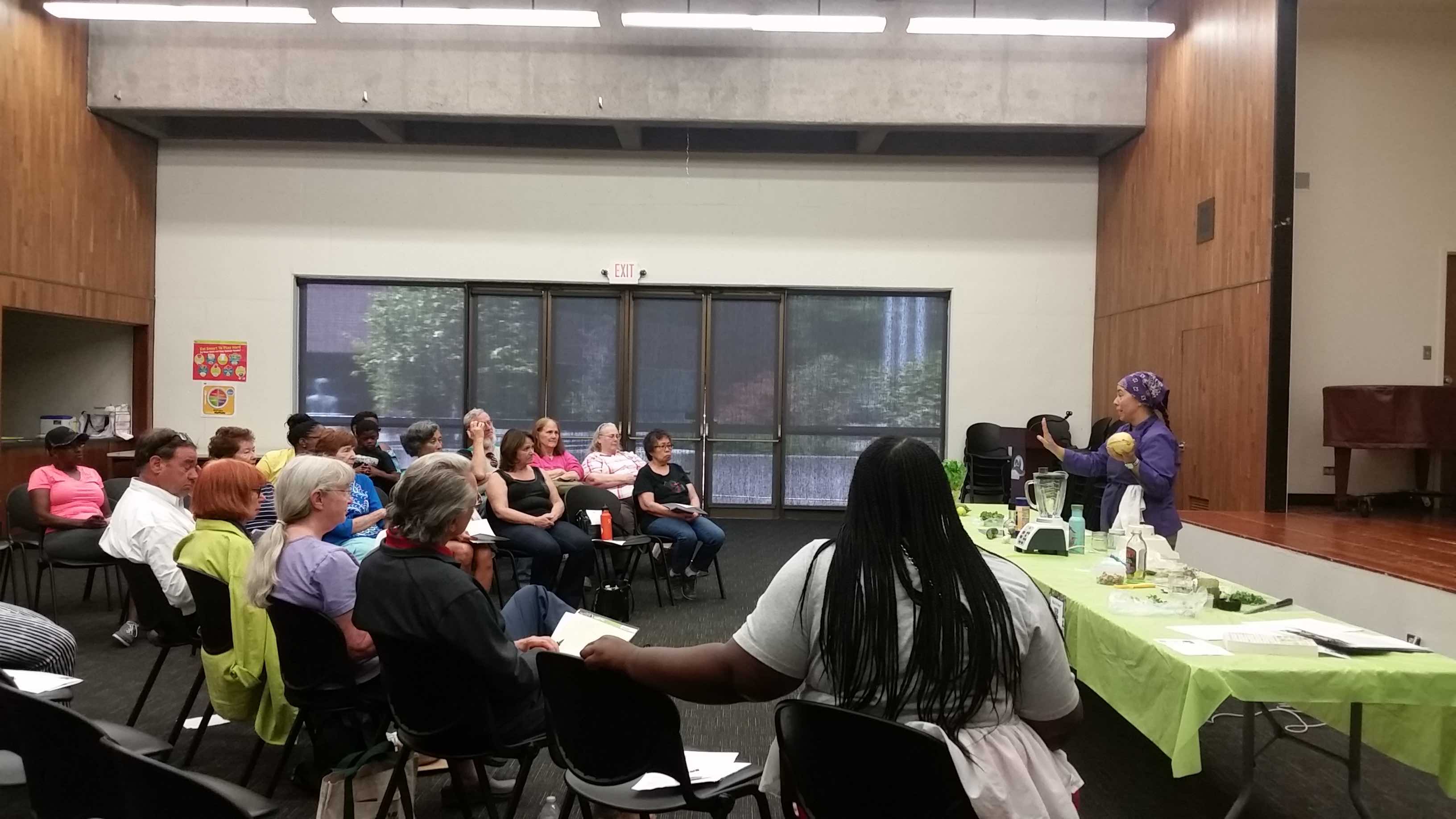
We had a full house on July 29th at John. F. Kennedy Library with over 20 people attending to hear Chef Lisa Núñez-Hancock teach about how to make classic pesto, other variations of the sauce, and how to use various types of squash as a healthy alternative for pasta.
Chef Lisa is founder of UR what U eat (workshops focused on a farm-to-table cooking philosophy and nutrition), a culinary arts instructor, natural food chef and food activist. She began class with a brief introduction on the Italian origins of traditional pesto sauce and being an enthusiast for healthy eating, dove into the nutritional and medicinal benefits of the basic ingredients. The most common pesto recipe consists of crushed garlic, basil and pine nuts blended with Parmesan cheese and olive oil. “Basil happens to be an anti-inflammatory and anti-bacterial food that can help reduce inflammation in the body,” Chef Lisa imparted. Other nut variations, such as walnuts and cashews, may be used to create unique and flavorful pestos. Nuts are loaded with heart-healthy fats that aid in increasing good cholesterol.
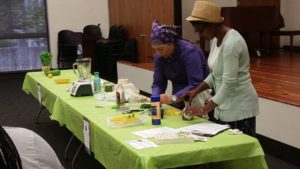 An enthusiastic teen was invited up to assist Chef Lisa in prepping the ingredients for her tasting samples that were later distributed and enjoyed. There was discussion on different leafy green varieties that can also be used to achieve equally delicious pesto sauces like spinach, arugula and even broccoli to name a few. The workshop closed with a quick raffle draw where winners took home some exciting veggie prizes such as a bright yellow spaghetti squash to begin experimenting replacing pasta for a lighter summer meal.
An enthusiastic teen was invited up to assist Chef Lisa in prepping the ingredients for her tasting samples that were later distributed and enjoyed. There was discussion on different leafy green varieties that can also be used to achieve equally delicious pesto sauces like spinach, arugula and even broccoli to name a few. The workshop closed with a quick raffle draw where winners took home some exciting veggie prizes such as a bright yellow spaghetti squash to begin experimenting replacing pasta for a lighter summer meal.
This conscious eating workshop series includes a book group that meets four times per year to discuss books relevant to healthy eating and the local food movement. Participants were able to get a sneak peak at the next book that will be discussed at our next summer book group meeting on Wednesday, August 30th called “What to EAT” by Marion Nestle. This book guides you through the supermarket, aisle by aisle, to help you make healthy, informed choices about food.
Workshop hosted by the John F. Kennedy library and in partnership with Sustainable Solano and UR what U eat.
The next seasonal cooking workshop for fall will be Saturday, September 16th where Chef Lisa Nuñez-Hancock will cover how to preserve vegetables and fruits. You will learn how to brine and ferment vegetables and how to make healthy, naturally sweetened fruit spreads.
Jun 12, 2017
Eating healthier and incorporating more fresh vegetables and fruits into our meals is the theme of the new series of healthy cooking workshops hosted by the John F. Kennedy library in partnership with Sustainable Solano and UR what U eat.
The first of these seasonal cooking workshops- Fresh Out of the Garden was held on May 6th at the downtown Vallejo Public Library and was a success with a great turnout of local residents. About 30 people, comprised of both adults and teens showed up to learn about healthy cooking and how to make spring rolls with traditional sauces.
Sabine Salek, the librarian in charge of adult services, welcomed the audience to the first in the four part series of free healthy cooking workshops. She has been instrumental in helping initiate the program which includes a conscious eating book group. The book group will have their first meeting on June 14th at 6:30 pm to discuss Michael Pollan’s Food Rules: An Eaters Manual.
For the first healthy cooking class the library set up a table at the entrance to the auditorium where participants could sign in, get flyers for future events, and peruse a selection of books related to healthy eating, gardening and Asian cuisine.
Chef Lisa Núñez-Hancock, a member of Sustainable Solano and founder of UR what U eat, is a culinary arts instructor, natural food chef and food activist. In collaboration with the library and Sustainable Solano she designed the program to raise consciousness about healthy food choices. Chef Lisa will be teaching all four seasonal cooking workshops and will help facilitate the conscious eating book group meetings with the library staff.
The event started with an introduction by Ms. Salek. Chef Lisa then explained the program to the audience, who gradually dribbled into the auditorium. She spoke about the importance of healthy eating and incorporating more vegetables into our daily diets. Then it was on to the culinary background and cultural and historical roots of the spring roll.
Instruction started with how to make the two traditional sauces, nước chấm and the peanut sauce, tương đậu phộng.
Two tables were set up in the auditorium and displayed all ingredients and utensils needed to make spring rolls at home. Techniques and knife skills to julienne vegetables were demonstrated and most importantly the techniques and set-up needed to handle rice paper wrappers.
Some teens were selected from the audience and invited to assist Chef Lisa in preparing the spring rolls. In their hands on experience they saw how easy and fun it was to make this healthy recipe once you got the hang of working with the rice wrappers. Teen volunteers also learned to not leave the rice wrappers in the water too long or you are left with a gummy mess!
Vegetarians, vegans and ominvores alike attended the workshop. The cooking class ended with all participants getting yummy samples of the delicious spring rolls and sauces.
Everyone who attended not only got a sample of the spring rolls, but also a copy of the recipes to take home. Organizers hope that an invisible take away from this seasonal cooking program will be to show how preparing food with your family can be a fun and healthy activity.
The next seasonal cooking workshop for Summer will be July 29th. In that workshop Chef Lisa will be teaching the group how to make fresh pesto sauce(s). In addition to the traditional basil and pine nut version she will also be demonstrating other delicious variations.
And, in the spirit of the theme of “eat more vegetables” the Summer class will show the techniques for preparing vegetable alternatives to pasta. Join the next group and in addition to exciting pesto variations, learn how to prepare spaghetti squash and turn zucchini and into fresh natural and healthy “pastas” for a truly veggie wonderful meal experience.
Apr 22, 2017
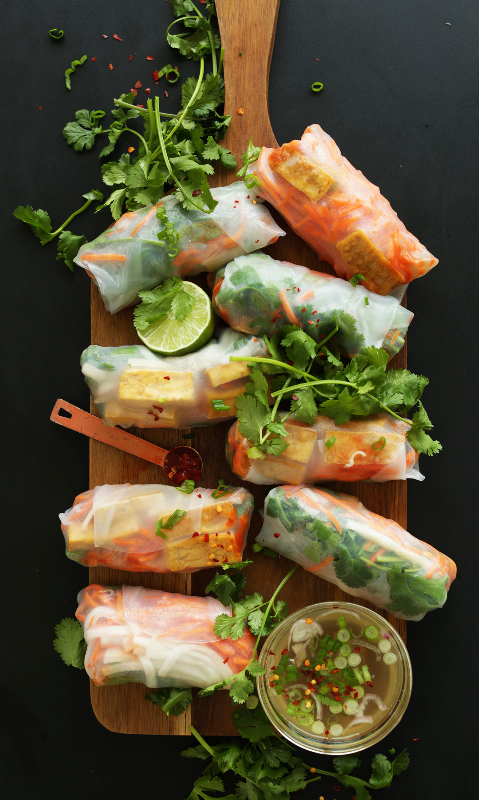 Sustainable Solano, The Vallejo Public Library and U R what U eat have partnered to bring the community a continuation of the What’s For Dinner? cooking and educational series (now in its 5th year). This year’s series features healthy cooking classes and conscious eating book group discussions. The series of cooking classes will take place quarterly and highlight the local and seasonal produce of the four seasons. All programs will take place at the John F. Kennedy Library in downtown Vallejo. The seasonal series of healthy cooking workshops will be taught by Lisa Núñez-Hancock, a culinary arts instructor, natural food chef, food activist and a member of Sustainable Solano’s advisory board focusing on the local food movement.
Sustainable Solano, The Vallejo Public Library and U R what U eat have partnered to bring the community a continuation of the What’s For Dinner? cooking and educational series (now in its 5th year). This year’s series features healthy cooking classes and conscious eating book group discussions. The series of cooking classes will take place quarterly and highlight the local and seasonal produce of the four seasons. All programs will take place at the John F. Kennedy Library in downtown Vallejo. The seasonal series of healthy cooking workshops will be taught by Lisa Núñez-Hancock, a culinary arts instructor, natural food chef, food activist and a member of Sustainable Solano’s advisory board focusing on the local food movement.
The idea behind the series What’s for Dinner? is to educate the community in healthy food choices and give them the skills to make their own delicious and nutritious food from fresh seasonal produce. Starting this Spring, the first of these seasonal cooking workshops-Fresh Out of the Garden will be held on Saturday May 6th at 2pm. Participants in this workshop will learn how to make spring rolls and complimentary sauces utilizing fresh vegetables from the Spring time garden. The workshop will show how this healthy and nutritious recipe can be a go to afternoon snack, light lunch, elegant appetizer or a protein packed anytime meal.
In the second seasonal cooking workshop highlighting the flavors of Summer the series will present Bright and Light Summer Recipes on July 29th. In this workshop participants will learn how to make classic pesto sauce from fresh basil and other healthy variations of this sauce utilizing fresh produce from the Summer garden. This workshop will also teach how to prepare spaghetti squash, a heathy vegetable alternative to pasta. All classes and book group meetings are free and open to the public, and all participants in each workshop will receive a copy of the recipe.
In conjunction with seasonal cooking workshops the series will also include a conscious eating book group. The group will meet four times a year to discuss books relevant to the local and global food movement and healthy eating. For the Spring meeting participants will read Michael Pollan’s Food Rules: An Eater’s Manual. The book group will meet on Wednesday June14th at 6:30pm discuss the book.
 Food Rules is a seminal book for healthy eating chock full of food wisdom. It cuts through all of the confusion and gives people simple guidelines to healthy eating.
Food Rules is a seminal book for healthy eating chock full of food wisdom. It cuts through all of the confusion and gives people simple guidelines to healthy eating.
“Eating doesn’t have to be so complicated. In this age of ever-more elaborate diets and conflicting health advice, Food Rules brings welcome simplicity to our daily decisions about food. Written with clarity, concision, and wit that has become bestselling author Michael Pollan’s trademark, this indispensable handbook lays out a set of straightforward, memorable rules for eating wisely, one per page, accompanied by a concise explanation. It’s an easy-to-use guide that draws from a variety of traditions, suggesting how different cultures through the ages have arrived at the same enduring wisdom about food. Whether at the supermarket or an all-you-can-eat buffet, this is the perfect guide for anyone who ever wondered, “What should I eat?”
Lisa Núñez-Hancock is a culinary arts instructor, natural food chef, food activist and founder of UR what U eat. Lisa has recently moved to Vallejo and is very excited about bringing her skills and knowledge about nutrition, food preparation and the politics around the food movement to the community. She has taught nutrition and healthy cooking classes for over nine years in inner-city after school programs, museums, libraries, homesteading hubs, at community centers, and as part of the Los Angeles Unified School District’s curriculum.
In her mission statement Lisa describes UR what U eat as a culinary program which provides hands-on healthy cooking and nutrition workshops to children, teens and adults. UR what U eat workshops teach basic cooking skills and fundamental principals of nutrition, while utilizing math and science skills as they relate to food preparation. Rooted in the fundamentals of the Slow Food Movement and the writings of Michael Pollan, UR what U eat embraces the philosophy of growing, preparing and eating real food. Workshops take participants through the complete food cycle, while at the same time preserving healthy multi-cultural culinary traditions. It is a program that promotes healthy and conscious eating for the entire family.
Lisa is currently working on a seasonal gardening/cookbook with her co-author Rick Perillo, a master gardener at the MUSE School in Southern California.
Look for updates on the Fall and Winter series workshops and book group selections.
Apr 7, 2017
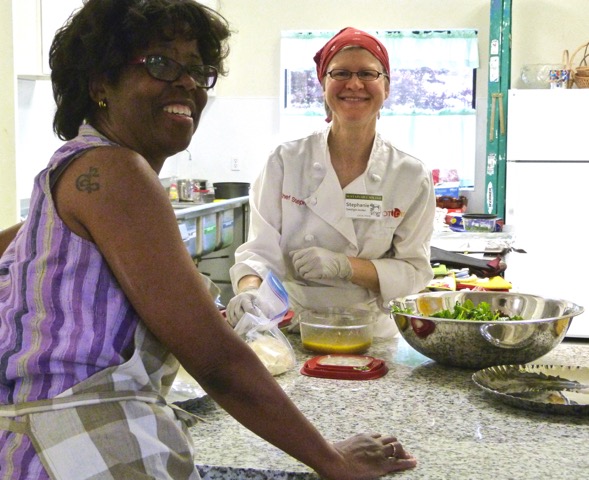
Chef Stephanie Oelsligle Jordan at Heritage Presbyterian Church kitchen with Chef Veronica Bearce, helper for the night.
Over the year, a special partnership has been growing between Sustainable Solano and Heritage Presbyterian Church, for the sake of creating a Community Food Center in Benicia, a dream that’s been taking shape with inspiration from Sustainable Solano’s Exec Director, Elena Karoulina and local chef Stephanie Oelsligle Jordan, and from the church’s Pastor Yung Me Morris and Heritage Presbyterian Church’s leadership board.
So what would a Benicia Community Food Center be, and be for?
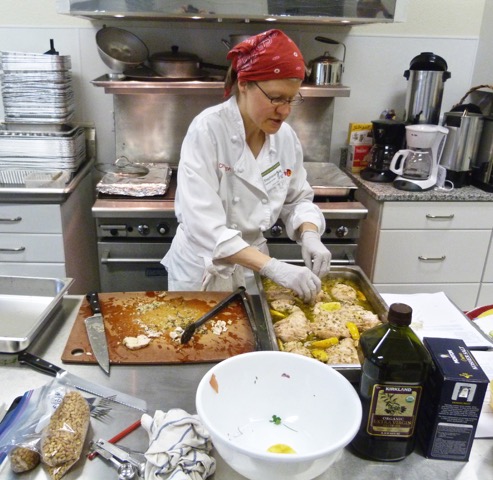 In the evening, April 5th, Sustainable Solano hosted members of Heritage’s congregation for a beautiful, seasonal buffet dinner prepared by chef Stephanie to discuss and celebrate the promise of a mutual venture that would be centered around the church’s as yet under-utilized kitchen. Recently, the church had had upgraded the kitchen, but not quite up to the commercial standard for select uses, such as for a catering business. Seeking funds for the necessary improvements to meet those standards (not for restaurant permitting level), the church and Sustainable Solano will be working toward that basic aim. Meanwhile, hope is afloat for creating an earth-friendly catering service led by local chefs who would prepare meals for “take out” for Benicia residents who don’t have the time, ability or income to cook healthy meals at home. In the future, residents who elect to participate would become subscribers to the program. Such a business arrangement would benefit local small farms and other local/regional suppliers of wild fish, organic meats, eggs and dairy. Becoming a community food “hub”, Heritage Presbyterian would become the delivery and pick up location for CSA (Community Supported Agricultural) boxes, as well as for deliveries of other food supplies (meats, fish, eggs, dairy). With Sustainable Solano’s “Swenson Garden” and Community Orchard located on the church property, it appears that HPC is growing into its new role helping to foster local access and distribution of healthy food within Benicia.
In the evening, April 5th, Sustainable Solano hosted members of Heritage’s congregation for a beautiful, seasonal buffet dinner prepared by chef Stephanie to discuss and celebrate the promise of a mutual venture that would be centered around the church’s as yet under-utilized kitchen. Recently, the church had had upgraded the kitchen, but not quite up to the commercial standard for select uses, such as for a catering business. Seeking funds for the necessary improvements to meet those standards (not for restaurant permitting level), the church and Sustainable Solano will be working toward that basic aim. Meanwhile, hope is afloat for creating an earth-friendly catering service led by local chefs who would prepare meals for “take out” for Benicia residents who don’t have the time, ability or income to cook healthy meals at home. In the future, residents who elect to participate would become subscribers to the program. Such a business arrangement would benefit local small farms and other local/regional suppliers of wild fish, organic meats, eggs and dairy. Becoming a community food “hub”, Heritage Presbyterian would become the delivery and pick up location for CSA (Community Supported Agricultural) boxes, as well as for deliveries of other food supplies (meats, fish, eggs, dairy). With Sustainable Solano’s “Swenson Garden” and Community Orchard located on the church property, it appears that HPC is growing into its new role helping to foster local access and distribution of healthy food within Benicia.
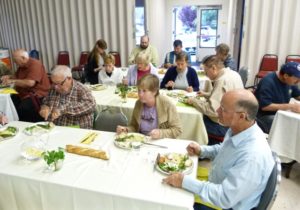
Heritage Presbyterian Church and Sustainable Solano Board members sharing meal and a conversation
Everyone attending the dinner enjoyed the delicious meal and applauded chef Stephanie. Most importantly, good questions were raised with the realization that answers and solutions could be found. Essentially, everyone felt the groundswell of excitement in cooperating to support the pilot plan for an enterprise that would serve people’s nutrition and health and community well-being. The vision was growing as everyone spoke up with ideas, such as connecting with Carquinez Village, St. Paul’s, and CAC. We were seizing the time and season for change—the time for learning and enabling new ways of doing and being together for the good of all life.
Mar 3, 2017
Our Seasonal Cooking Seafood Class is Wednesday, March 8 and we’re cooking through our CSF partner’s weekly seafood box, so we did a little Q&A with Anna Larsen of Siren Fish Co.
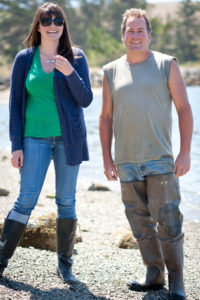
Why CSF?
Community supported fisheries reduce food miles, educate the public on their local fishing community, provide seafood of unparalleled variety and freshness, and encourage fishers to use more sustainable fishing methods. It’s a win for all parties!
Where does Siren source?
We mainly source from Bodega Bay and Ft. Bragg, with occasional jaunts to Monterey and a rare trip to Santa Barbara to source white sea bass. All of our finfish is wild and all of our shellfish is sustainably farmed in open ocean beds.
How is it different than the seafood we get at Monterey Fish Market or Tokyo Fish Market or Berkeley Bowl?
There are a few key differences, the most apparent being freshness. Because we are asking members to select their shares in advance, we are able to time our buying so that the fish is generally 1 to 2 days out of the water. We don’t need to keep fish in a case until we sell it, we bring in and immediately send out just what we need. Also, since we are sourcing only a couple of items at a time, we are able to provide details on the fisher or farmer who produced your catch, as well as maintain very tight quality and sourcing controls.
I love seafood but am scared to commit to cooking it every (week?). Any advice?
We make sure that you are prepared to cook and enjoy whatever we send you. You’ll have step by step storage and preparation instructions as well as recipes. Also, since our seafood is coming directly from the water to you, you actually have 5 days or so to prepare your share before the quality starts to drop off. There’s no need to rush to cook most items on the day you receive them. There are exceptions to this (herring, sand dabs) but we will alert members in advance that these items need to be enjoyed immediately. We also allow members to put their shares on hold for vacations, scheduling conflicts, or when life gets too busy to cook.
We offer many drop locations and home delivery throughout the bay area!
Benicia and
Vallejo drop-offs are on Wednesdays. A full updated listing can be found
here.



 An enthusiastic teen was invited up to assist Chef Lisa in prepping the ingredients for her tasting samples that were later distributed and enjoyed. There was discussion on different leafy green varieties that can also be used to achieve equally delicious pesto sauces like spinach, arugula and even broccoli to name a few. The workshop closed with a quick raffle draw where winners took home some exciting veggie prizes such as a bright yellow spaghetti squash to begin experimenting replacing pasta for a lighter summer meal.
An enthusiastic teen was invited up to assist Chef Lisa in prepping the ingredients for her tasting samples that were later distributed and enjoyed. There was discussion on different leafy green varieties that can also be used to achieve equally delicious pesto sauces like spinach, arugula and even broccoli to name a few. The workshop closed with a quick raffle draw where winners took home some exciting veggie prizes such as a bright yellow spaghetti squash to begin experimenting replacing pasta for a lighter summer meal. Sustainable Solano, The Vallejo Public Library and U R what U eat have partnered to bring the community a continuation of the What’s For Dinner? cooking and educational series (now in its 5th year). This year’s series features healthy cooking classes and conscious eating book group discussions. The series of cooking classes will take place quarterly and highlight the local and seasonal produce of the four seasons. All programs will take place at the John F. Kennedy Library in downtown Vallejo. The seasonal series of healthy cooking workshops will be taught by Lisa Núñez-Hancock, a culinary arts instructor, natural food chef, food activist and a member of Sustainable Solano’s advisory board focusing on the local food movement.
Sustainable Solano, The Vallejo Public Library and U R what U eat have partnered to bring the community a continuation of the What’s For Dinner? cooking and educational series (now in its 5th year). This year’s series features healthy cooking classes and conscious eating book group discussions. The series of cooking classes will take place quarterly and highlight the local and seasonal produce of the four seasons. All programs will take place at the John F. Kennedy Library in downtown Vallejo. The seasonal series of healthy cooking workshops will be taught by Lisa Núñez-Hancock, a culinary arts instructor, natural food chef, food activist and a member of Sustainable Solano’s advisory board focusing on the local food movement. Food Rules is a seminal book for healthy eating chock full of food wisdom. It cuts through all of the confusion and gives people simple guidelines to healthy eating.
Food Rules is a seminal book for healthy eating chock full of food wisdom. It cuts through all of the confusion and gives people simple guidelines to healthy eating.
 In the evening, April 5th, Sustainable Solano hosted members of Heritage’s congregation for a beautiful, seasonal buffet dinner prepared by chef Stephanie to discuss and celebrate the promise of a mutual venture that would be centered around the church’s as yet under-utilized kitchen. Recently, the church had had upgraded the kitchen, but not quite up to the commercial standard for select uses, such as for a catering business. Seeking funds for the necessary improvements to meet those standards (not for restaurant permitting level), the church and Sustainable Solano will be working toward that basic aim. Meanwhile, hope is afloat for creating an earth-friendly catering service led by local chefs who would prepare meals for “take out” for Benicia residents who don’t have the time, ability or income to cook healthy meals at home. In the future, residents who elect to participate would become subscribers to the program. Such a business arrangement would benefit local small farms and other local/regional suppliers of wild fish, organic meats, eggs and dairy. Becoming a community food “hub”, Heritage Presbyterian would become the delivery and pick up location for CSA (Community Supported Agricultural) boxes, as well as for deliveries of other food supplies (meats, fish, eggs, dairy). With Sustainable Solano’s “Swenson Garden” and Community Orchard located on the church property, it appears that HPC is growing into its new role helping to foster local access and distribution of healthy food within Benicia.
In the evening, April 5th, Sustainable Solano hosted members of Heritage’s congregation for a beautiful, seasonal buffet dinner prepared by chef Stephanie to discuss and celebrate the promise of a mutual venture that would be centered around the church’s as yet under-utilized kitchen. Recently, the church had had upgraded the kitchen, but not quite up to the commercial standard for select uses, such as for a catering business. Seeking funds for the necessary improvements to meet those standards (not for restaurant permitting level), the church and Sustainable Solano will be working toward that basic aim. Meanwhile, hope is afloat for creating an earth-friendly catering service led by local chefs who would prepare meals for “take out” for Benicia residents who don’t have the time, ability or income to cook healthy meals at home. In the future, residents who elect to participate would become subscribers to the program. Such a business arrangement would benefit local small farms and other local/regional suppliers of wild fish, organic meats, eggs and dairy. Becoming a community food “hub”, Heritage Presbyterian would become the delivery and pick up location for CSA (Community Supported Agricultural) boxes, as well as for deliveries of other food supplies (meats, fish, eggs, dairy). With Sustainable Solano’s “Swenson Garden” and Community Orchard located on the church property, it appears that HPC is growing into its new role helping to foster local access and distribution of healthy food within Benicia.

